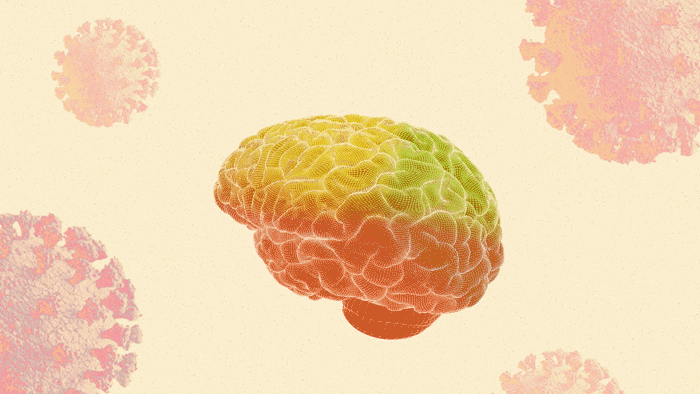Researchers are continuing to study the long-term effects of COVID-19. And now, there's evidence to suggest that a third of COVID-19 survivors are struggling with brain disease or other psychiatric disorders.
That's the major takeaway from new research published in The Lancet Psychiatry on Tuesday. The study analyzed data over a six month period from 236,379 patients who were diagnosed with COVID-19. The researchers discovered that 34% of COVID-19 survivors had a diagnosis for either a neurological or psychological condition within six months after they were infected.
A little more than 17% of those patients were diagnosed with anxiety, while 14% were diagnosed with some form of mood disorder. A smaller number of former patients experienced brain hemorrhaging, stroke, or dementia—all of which can be considered types of brain disease.
The incidences were higher the more severe a person's COVID-19 illness. More than 19% of patient who were in the ICU when they had COVID-19 struggled with anxiety, while nearly 3% were diagnosed with a psychotic disorder. The percentages of those who were diagnosed with neurological conditions like stroke and brain bleeding were also higher in this group.
The researchers also compared data from people who had COVID-19 with those who had other respiratory tract infections at the same time. What they found: People who had COVID-19 had a 44% higher risk of neurological and psychiatric illness than those who recently recovered from the flu.
That said, the researchers also discovered that two neurological diseases that are common with viruses— Guillain-Barré and parkinsonism (a group pf neurological disorders that cause movement issues similar to Parkinson's disease)—weren't any more common in COVID-19 survivors than patients who had recovered from other viruses. In the study, the researchers said that the reason why was "unclear," but also suggested that some patients may develop parkinsonism in the future, calling it a "delayed outcome."
"Our results indicate that brain diseases and psychiatric disorders are more common after COVID-19 than after flu or other respiratory infections, even when patients are matched for other risk factors," study co-author Max Taquet, PhD, a professor at the University of Oxford's Department of Psychiatry, said in a press release.
While the study didn't uncover why this link exists, Paul Harrison, lead author of the study and associate head of the department of psychiatry at the University of Oxford, tells Health that there are some theories. "One of the more obvious explanations may be that COVID-19 affects the brain more than other viruses. It gets into the brain directly," he says.
There is also a known link between severe illness and neurological and psychological complications, infectious disease expert Amesh A. Adalja, MD, senior scholar at the Johns Hopkins Center for Health Security, tells Health. "This is well described in scientific literature," he says, citing sedatives, paralytic medications, and disruption of the sleep-wake cycle as possible reasons why someone who is hospitalized with a serious illness might have brain after-effects. "But the mild cases…we don't understand why that happens," he says. "It may be the result of inflammation that occurs during the illness. We've really just started scratching the surface of what this means for mild cases."
There are limitations to the study, though. "It could be that your doctor is more likely to notice the symptoms you may have," Harrison says. "It could also be that people who are recovering from COVID are monitoring their bodies more closely and looking for symptoms." However, Harrison says it's more likely that COVID-19 actually impacts the brain in some way.
This also isn't the first study to link COVID-19 with brain disease. A study published in March 2020 of 730 COVID-19 patients in China found that 96.2% of them experienced some symptoms of post-traumatic stress syndrome (PTSD) after recovering from the virus. Another study of 381 former COVID-19 patients treated at a hospital in Rome, Italy, found that 30% experienced PTSD after they recovered from the virus.
And yet another study, this one of 74 patients in the Boston area who were diagnosed with COVID-19, found that 18 were admitted to the hospital due to stroke after having the virus, 15 had seizures, and 26 experienced confusion and delirium.
Research on the impact of COVID-19 on the brain is continuing, but Harrison says people who have had the virus shouldn't panic. "Two-thirds of people did not have any of these problems," he says. "The average person after COVID is not going to have these problems. We need to have this in perspective." Still, if you've recovered from COVID-19 and are noticing any new neurological or psychiatric issues, it's best to bring them up to your doctor.
The information in this story is accurate as of press time. However, as the situation surrounding COVID-19 continues to evolve, it's possible that some data have changed since publication. While Health is trying to keep our stories as up-to-date as possible, we also encourage readers to stay informed on news and recommendations for their own communities by using the CDC, WHO, and their local public health department as resources.
Source: Read Full Article

